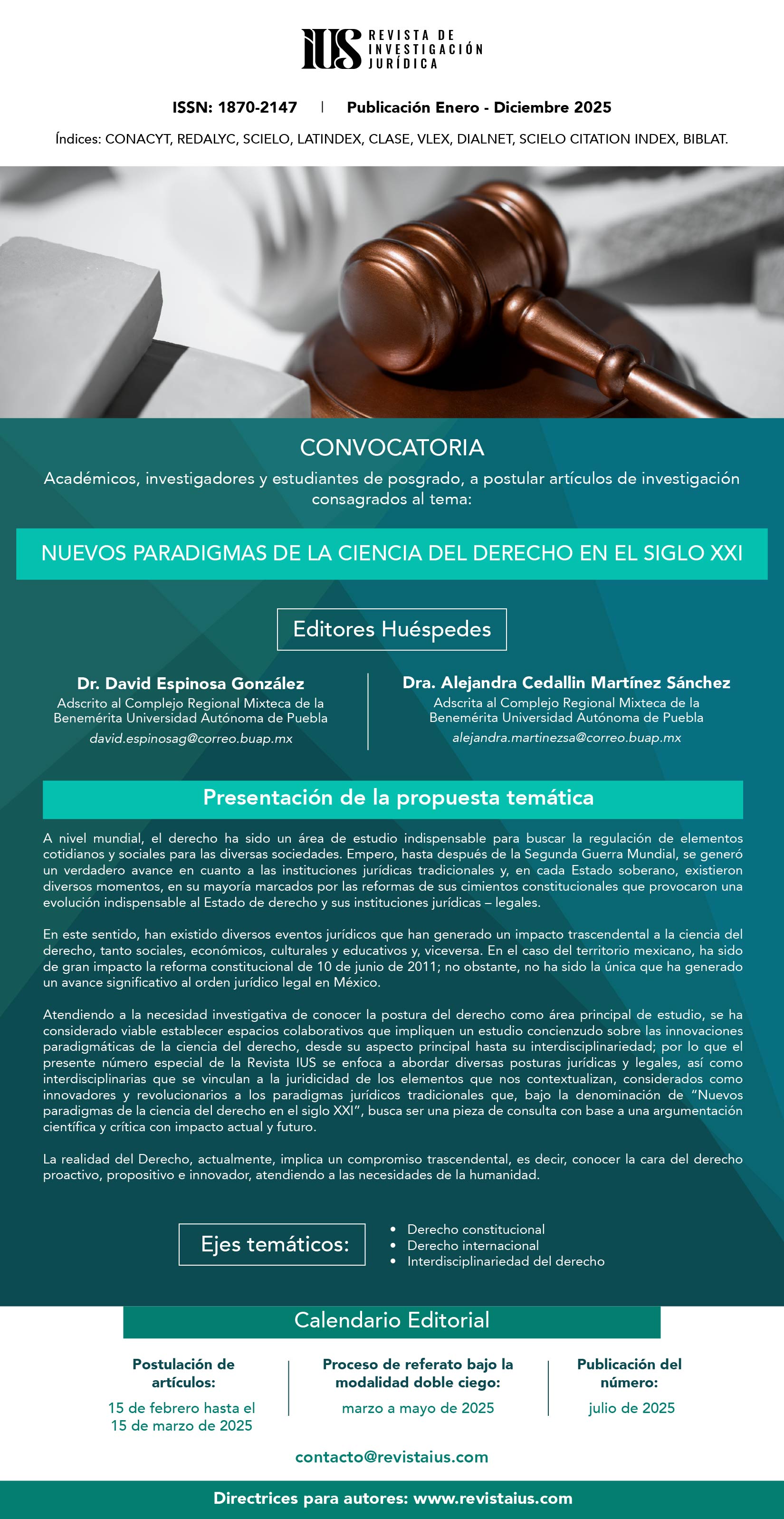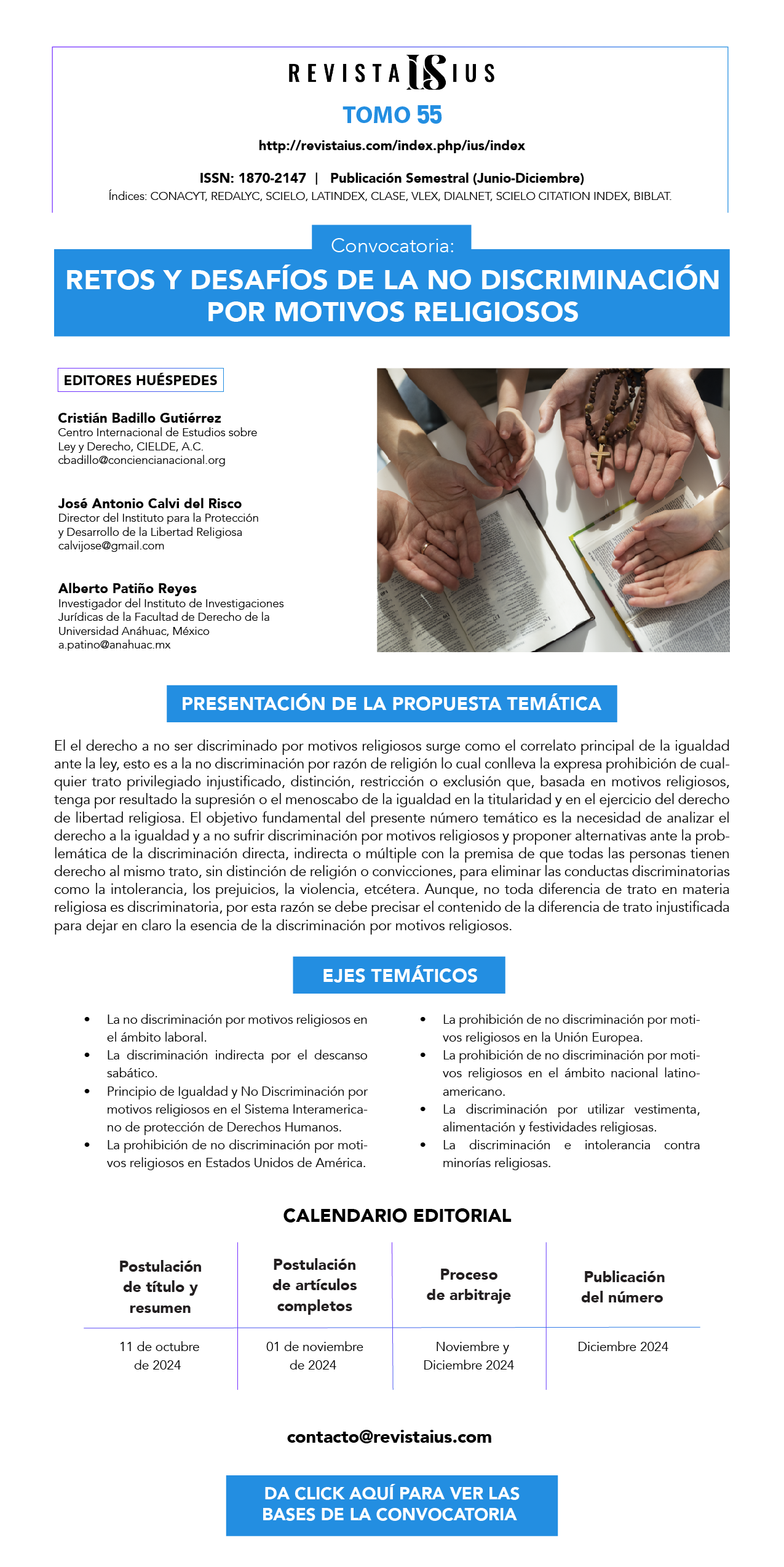La suspensión condicional del proceso penal: reflejo de la difícil armonización entre eficiencia y efectividad en los sistemas penales
DOI:
https://doi.org/10.35487/rius.v13i44.2019.451Keywords:
Proceso penal, Salidas alternas al proceso y al juicioAbstract
En las últimas décadas, diversos países latinoamerica- nos han emprendido reformas procesales-penales de gran calado, entre las cuales se encuentra la introduc- ción de mecanismos para atender asuntos penales al margen del proceso penal y el juicio. Tal es el caso de la suspensión condicional del proceso penal. Este artículo explica, a través del caso de la suspensión condicional del proceso regulada en México, por qué la búsqueda de eficiencia operativa del sistema penal puede compro- meter, en últimas, su efectividad para brindar respues- tas justas.
Downloads
References
Albrecht, H. J. (2000). Criminal Prosecution: Developments, Trends and Open Questions in the Federal Republic of Germany. European Journal of Crime, Criminal Law and Criminal Justice, 8, 245-256. http://doi.org/10.1163/15718170020519175
Andrews, D., & Bonta, J. (2010). The psychology of criminal conduct (5a ed.). New Providence: LexisNexis. http://doi.org/10.1017/CBO9781107415324.004
Armenta Deu, T. (1991). Criminalidad de Bagatela y Principio de Oportunidad: Alemania y España. Barcelona: Promociones y Publicaciones Universitarias.
Armenta Deu, T. (2012). Sistemas procesales penales. La justicia penal en Europa y América. Madrid: Marcial Pons.
Armenta Deu, T. (2013). Algunas reflexiones en torno a la convergencia entre los procesos civil y penal y la deriva común hacia métodos extrajurisdiccionales. En T. Armenta Deu (Ed.), La Convergencia entre proceso civil y penal: ¿una dirección adecuada? (pp. 227-254). Madrid: Marcial Pons.
Ashworth, A., & Redmayne, M. (2010). The Criminal process. Oxford: Oxford University Press.
Azzolini Bincaz, A. B. (2015). Las salidas alternas al juicio: acuerdos reparatorios y suspensión condicional del proceso. En S. García Ramírez & O. Islas de González Mariscal (Eds.), El Código Nacional de Procedimientos Penales. Estudios (pp. 239-254). Ciudad de México: IIJ-UNAM. Recuperado a partir de https://biblio.juridicas.unam.mx/bjv/detalle-libro/4032-el-codigo-nacional-de-procedimientos-penales-estudios
Baxter, P., & Jack, S. (2008). Qualitative case study methodology: Study design and implementation for novice researchers. The qualitative report, 13(4), 544-559.
Bergman, M., Azaola, E., Magaloni, A. L., & Negrete, L. (2003). Delincuencia, marginalidad y desempeño institucional: resultados de la encuesta a población en reclusión en el Distrito Federal y el Estado de México. Ciudad de México: CIDE.
Boone, M., & Herzog-Evans, M. (2013). Decision-Making and Offender Supervision. En Offender Supervision in Europe (pp. 51-96). Basingstoke.
Bovino, A. (2001). La suspensión del procedimiento penal a prueba en el Código Penal argentino. (Editores del Puerto, Ed.). Argentina: Editores del Puerto.
Braithwaite, J. (1995). Diversion, reintegrative shaming and republican criminology. En G. Albrecht (Ed.), Diversion and Informal Social Control (pp. 141-157). Berlin: Walter de Gruyter.
Brants-Langeraar, C. H. (2007). Consensual Criminal Procedures: Plea and Confession Bargaining and Abbreviated Procedures to Simplify Criminal Procedure. Electronic Journal of Comparative Law, 11.1, 1-30.
Chaple, M. (2011). Pretrial Diversion & Record Sealing: A Promising Approach to Reduce Recidivism among Substance Abusing Offenders. University of New Jersey. Recuperado a partir de https://search.proquest.com/openview/660407f91200b7ebe70f217bf623f7e3/1?pq-origsite=gscholar&cbl=18750&diss=y
Cohen, S. (1988). Visiones de control social: delitos, castigos y clasificaciones. ((trad. Elena Larrauri), Ed.). Barcelona: PPU.
Crawford, A. (2009). Restorative Justice and Anti-Social Behavior Interventions as Contractual Governance: Constructing the Citizen-Consumer. En P. Knepper, J. Doak, & J. Shapland (Eds.), Urban Crime Prevention, Surveillance and Restorative Justice. Effects of Social Technologies (pp. 167-194). Florida: CRC Press.
Creswell, J. W. (2007). Qualitative inquiry and research design: Choosing among five approaches (2.a ed.). http://doi.org/10.1111/1467-9299.00177
Daly, K. (2013). The Punishment Debate in Restorative Justice. En J. Simon & R. Sparks (Eds.), The SAGE Handbook of Punishment and Society Handbook of Punishment and Society (pp. 356-374). London: SAGE Publications.
Damaska, M. (2004). Negotiated Justice in International Criminal Courts. Journal of International Criminal Justice, 2, 1018-1039.
Denzin, N. K., & Lincoln, Y. S. (2011). The SAGE handbook of qualitative research. California: SAGE.
Flávio Gomes, L. (1997). El nuevo paradigma de la justicia criminal consensuada: planteamientos sobre la Ley Brasileña 9.099/95. Boletín de la Facultad de Derecho, (12), 363-387.
Fondevila, G., Langer, M., Bergman, M., Vilalta, C., & Mejía, A. (2016). ¿Cómo se juzga en el Estado de México? Ciudad de México. Recuperado a partir de mexicoevalua.org/wp-content/uploads/2016/10/Como_Juzga_Edomex.pdf
Forst, B. (2013). Wrongful Convictions in a World of Miscarriages of Justice. En C. R. Huff & M. Killias (Eds.), Wrongful Convictions & Miscarriages of Justice. Causes and Remedies in North American and European Criminal Justice Systems (pp. 15-44). New York: Routledge.
Galain Palermo, P. (2013). La reparación del daño en un sistema penal funcional a las necesidades de la política criminal. En M. De Hoyos Sancho (Ed.), Garantías y derechos de las víctimas especialmente vulnerables en el marco jurídico de la Unión Europea (pp. 557-589). España: Tirant lo Blanch.
García Aguilar, R. (1998). La suspensión del proceso a prueba en materia penal. San José: Investigaciones Jurídicas.
García Ramírez, S. (2017). Tres ordenamientos del «nuevo sistema penal» Mecanismos alternativos, ejecución de penas y justicia para adolescentes. Boletín Mexicano de Derecho Comparado, 50(149).
Garrett, B. L. (2012). Introduction: New England Law Review Symposium on «Convicting the Innocent». New England Law Review, 46, 671-687.
Heiskanen, M., Aebi, M. F., Van der Brugge, W., & Jehle, J.-M. (2014). Recording Community Sanctions and Measures and Assessing Attrition. A Methodological Study on Comparative Data in Europe. Helsinki. Recuperado a partir de www.heuni.fi/material/attachments/heuni/reports/.../HEUNI_report_no._77.pdf
Horwitz, A. V. (1995). Diversion in the Juvenile Justice System and a Sociological Theory of Social Control. En G. Albrecht & W. Ludwig-Mayerhofer (Eds.), Diversion and Informal Social Control (pp. 17-34). Berlin: De Gruyter.
Houed Vega, M. A. (2007). De la suspensión del proceso a prueba o de la suspensión condicional de la persecución penal. Nicaragua: Instituto de Estudio e Investigación Jurídica.
Hyett, N., Kenny, A., & Dickson-Swift, V. (2014). Methodology or method a critical review of qualitative case study reports. International Journal of Qualitative Studies on Health and Well-being, 9(1), 1-12. http://doi.org/10.3402/qhw.v9.23606
Jehle, J.-M., Smit, P., & Zila, J. (2008). The Public Prosecutor as Key-Player: Prosecutorial Case-Ending Decisions. European Journal on Criminal Policy and Research, 14(2-3), 161-179. http://doi.org/10.1007/s10610-008-9078-3
Kohler-Hausmann, I. (2013). Misdemeanor Justice: Control without conviction. American Journal of Sociology, 119(2), 351-393.
Kohler-Hausmann, I. (2014). Managerial justice and mass misdemeanors. Stanford Law Review, 66(3), 611-694.
Langer, M. (2007). Revolution in Latin American Criminal Procedure: Diffusion of Legal Ideas from the Periphery. The American Journal of Comparative Law, 55, 617-676.
Lhuillier, J. (2010). Contractualisation (consensus oriented approach) and Judicial Process in Europe. Estrasburgo. Recuperado a partir de http://www.coe.int/t/dghl/cooperation/cepej/series/default_en.asp
Macdonald, S. (2008). Constructing a Framework for Criminal Justice Research: Learning from Packer’s Mistakes. New Criminal Law Review, 11(2), 257-311. http://doi.org/10.1525/nclr.2008.11.2.257
Marino, E. (1993). Suspensión del Procedimiento a Prueba. En J. B. J. Maier (Ed.), El Nuevo Código Penal Procesal de la Nación (pp. 29-41). Buenos Aires: Editores del Puerto.
Martínez Monroy, R. (2008). Reforma constitucional en materia de justicia penal y seguridad pública. Proceso Legislativo. México.
Natapoff, A. (2012). Misdemeanors. Southern California Law Review, 85, 1314-1376.
Natapoff, A. (2015). Misdemeanor Decriminalization. Vanderbilt Law Review, 68(4), 1055-1116.
Ortiz de Urbina, I. (2004). Análisis Económico del Derecho y Política Criminal. Revista de Derecho penal y Criminología, 2(2004), 31-73.
Pollitz, A., McLean, S. J., & Kennedy, M. (2012). Sidestepping justice? Adjournments in Contemplation of Dismissal in Misdemeanor Court. Albany Law Review, 76(3), 1713-1750.
Riego, C., & Duce, M. (2002). Introducción al Nuevo Proceso Penal. Santiago: Universidad Diego Portales.
Rios Espinoza, C. (2008). Redesigning Mexico’s Criminal Procedure: The States’ Turning Point. Sw. J. Int’l L., 15, 54-82.
Roldán, N. (2016, diciembre 26). ¿Por qué los delitos quedan impunes en la CDMX? Policías narran qué pasa en los MP. Pájaro Político. Ciudad de México. Recuperado a partir de http://www.animalpolitico.com/2016/12/investigacion-policia-impunidad-cdmx/
Silva Sánchez, J. M. (1996). Eficiencia y Derecho Penal. Anuario de derecho penal y ciencias penales, 93-128.
Spierenburg, P. C. (1984). The spectacle of suffering: Executions and the evolution of repression: From a preindustrial metropolis to the European experience. Cambridge University Press.
Tak, P. J. P. (2012). The Dutch Prosecutor. A Prosecuting and Sentencing Officer. En E. Luna & M. Wade (Eds.), The Prosecutor in Transnational Perspective (pp. 135-155). Oxford University Press. http://doi.org/10.1093/acprof:osobl/9780199844807.003.0011
Thaman, S. C. (2010). A Tipology of Consensual Criminal Procedures: An Historical and Comparative Perspective on the Theory and Practice of Avoiding the Full Criminal Trial. En S. C. Thaman (Ed.), World Plea Bargaining. Consensual Procedures and the Avoidance of the Full Criminal Trial (pp. 297-396). Durham: Carolina Academic Press.
TSJCDMX. (2017). Informe estadístico mensual. Ciudad de México. Recuperado a partir de http://www.poderjudicialcdmx.gob.mx/transparencia/art-121/#fracciones/
Tulkens, F. (2005). Negotiated Justice. En M. Delmas-Marty & J. R. Spencer (Eds.), European criminal procedures (pp. 641-687). Cambridge: Cambridge University Press.
Tyler, T. R. (2012). Justice and Effective Cooperation. Social Justice Research, 25(4), 355-375. http://doi.org/10.1007/s11211-012-0168-5
UNODC. (2014). The Status and Role of Prosecutors. A United Nations Office on Drug and Crime and International Association of Prosecutors Guide. New York. Recuperado a partir de https://www.unodc.org/documents/justice.../14-07304_ebook.pdf
Valverde, M., & O’Malley, P. (2014). Criminology. En M. Valverde (Ed.), The Oxford Handbook of Criminal Law (pp. 3-24). Oxford: O’Malley, Pat.
Vasconcelos Méndez, R. (2008). La suspensión del proceso penal a prueba. Revista del Instituto de la Judicatura, 123-166.
Vázquez, C. (2017). Los retos de las pruebas periciales a partir del nuevo Código Nacional de Procedimientos Penales. Apuntes desde la epistemología jurídica. Problema: Anuario de Filosofía y Teoría del Derecho, (11), 341-378.
Vitale, G. L. (1996). Suspensión del proceso penal a prueba. Buenos Aires: Editores del Puerto.
Voss, M. (1995). Efficiency interests and the «Rule of law» in informal proceedings. En G. Albrecht & W. Ludwig-Mayerhofer (Eds.), Diversion and Informal Social Control (pp. 353-368). Berlin: Walter de Gruyter.
Walther, S. (2004). Communication over Confrontation: Modern Criminal Procedure in Transformation. En A. Eser & C. Rabenstein (Eds.), Criminal justice between crime control and due process: convergence and divergence in criminal procedure systems (pp. 367-379). Berlín: Duncker & Humblot.
Yin, R. K. (2009). Case study research. Design and methods. SAGE Publications.
Zlatic, J., Wilkerson, D., & McAllister, S. (2010). Pretrial Diversion: The Over-Looked Pretrial Services Evidence-Based Practice. Fed. Probation, 74(1), 1-10.
Downloads
Published
Issue
Section
License
Revista IUS, published by the Legal Sciences Institute of Puebla A.C., is distributed under the Creative Commons Attribution-NonCommercial 4.0 International (CC BY-NC 4.0) license.
We authorize collaborators to upload a copy of their published work on their personal websites or any Open Access repository, provided that Revista IUS is specifically cited as the original source, indicating the year and issue of the respective example and adding the link to the webpage on which this publication can be freely consulted in toto and without charge: http://www.revistaius.com
Readers are free to:
Share, copy and redistribute the material via any medium or format.
The licensor cannot revoke these freedoms as long as you follow the license terms.
Under the following terms:
Attribution: You must give appropriate credit, provide a link to the license, and indicate if changes were made.
You may do so in any reasonable manner, but not in any way that suggests the licensor endorses you or your use.
NonCommercial – You may not use the material for commercial purposes.
If you remix, transform or build upon the licensed material, its distribution is not permitted.
Charges for managing articles: Revista IUS will not charge for receiving, processing or publishing articles (Article Processing Charge, or APC) submitted by authors.





